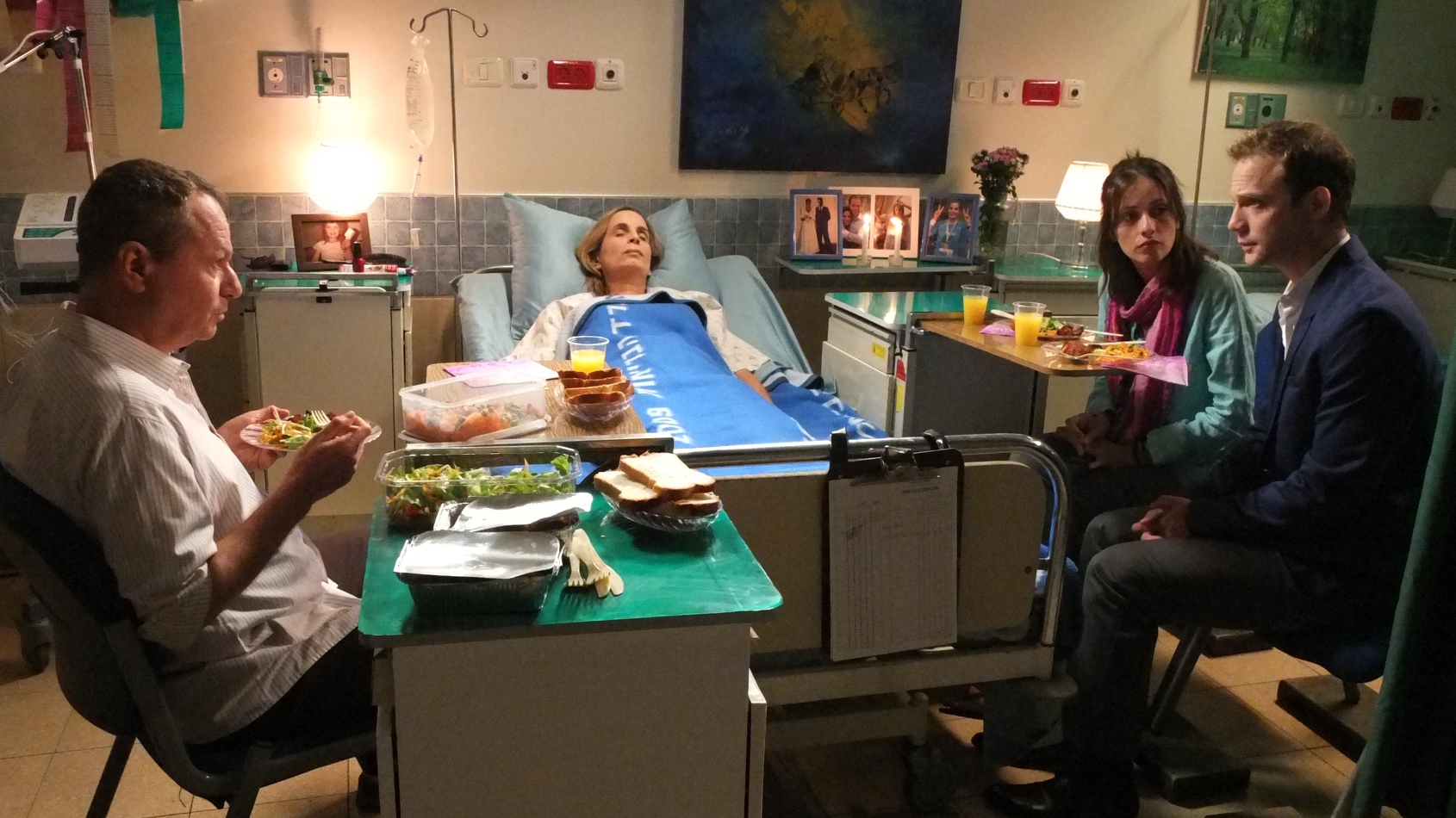 Lior Raz is the co-writer and plays a vital leading role in Fauda, currently the biggest hit TV series in Israel. Surprisingly, this thriller about an Israeli combat unit (or Mista’arvim) working undercover disguised as Arabs, is a hit with the Arab community. This is because it is even-handed in its portrayal of the hopes and fears and the good and the bad in both communities. It is a phenomenon then, particularly right now, as violence escalates again on the streets of Israel. Judi Herman spoke to Lior Raz ahead of his visit to the UK Jewish Film Festival for a Q&A session following the second of three cinema screenings of all 12 episodes of Fauda at JW3.
Lior Raz is the co-writer and plays a vital leading role in Fauda, currently the biggest hit TV series in Israel. Surprisingly, this thriller about an Israeli combat unit (or Mista’arvim) working undercover disguised as Arabs, is a hit with the Arab community. This is because it is even-handed in its portrayal of the hopes and fears and the good and the bad in both communities. It is a phenomenon then, particularly right now, as violence escalates again on the streets of Israel. Judi Herman spoke to Lior Raz ahead of his visit to the UK Jewish Film Festival for a Q&A session following the second of three cinema screenings of all 12 episodes of Fauda at JW3.
Fauda is Arabic for chaos – not just an apt description of the state of lives on both sides that is often used in the present situation, but the code word the unit uses when its cover is blown.
“I think our show demonstrates how complicated the situation is between us and the Palestinians”, declares Raz. Complicated indeed so I wonder how Raz and his co-writer, journalist Avi Issacharoff, manage to be so even handed. I have noticed from the credits that the production team seems to be Jewish Israelis and yet they show the Palestinian community and their hopes and fears so compassionately.
“Actually part of our production team was Arab and that was very important for us to hear their voices throughout the production. Our script manager for example, she was an Arab Israeli. And my co-creator Avi Issacharoff is one of the best Israeli reporters dealing with Arab issues on a daily basis. And for us it was very important to show the other side and to let the Israelis know and try to understand and maybe to have a little bit of compassion for the other side. We wanted to talk about the price that everybody pays.” He says simply.
“For me as an actor when we wrote the Arab parts, it was very important that they wouldn’t be flat characters, that they were rounded, the bad guys and the good guys. Because when you play the bad guy you have to convince the audience that the bad guys are human beings and let the audience be the judge. Actually everything is very similar for the Israeli and Arab characters. Both are shown fighting and the price that their families and friends pay is so huge and it doesn’t matter if you’re Arab or Israeli. And that is even though the narrative of the story is Israeli, because it’s not an Arab show it’s Israeli. We’re talking about the pain we have to deal with.”
The reality of that pain is all too personal for Raz. I had been moved to read that although it’s made clear that none of the characters or events in Fauda is real, the third episode is dedicated to the memory of a real woman, Iris Azulai, stabbed 25 years ago in Jerusalem in the sort of terrorist attack featured in Fauda. When I ask him to tell me more about her, he tells me she was his girlfriend, aged just 18 when she was murdered. “So that’s why we based a character in that episode on her.”
He says he drew on his own reactions to his terrible loss in the writing. “The way her boyfriend reacted, was just how I used to act when I was in the army when she was murdered.” When he tells me it is 25 years to the day since Iris died, he can tell that I’m fighting back tears and comforts me. But his answer is uncompromising when I go on to talk about the violence in the show, which far from playing for sympathy for the Mista’arvim, does not shirk from showing members of the Israeli unit as trigger-happy and heavy-handed right from the start, where a joyful Arab wedding scene becomes a scene of devastation.
“A guy comes towards us with a knife, so for me the knife is a weapon. And yes it’s a big question what to do if someone is running against your friend with a knife. When you do this kind of action, working undercover, it’s quite a scary thing. When you get inside these kinds of places everything is very dangerous and if you see a knife it means someone wants to kill you or your friend and you have to kill him first.” And Iris, he says, might not have died if only one of the knifeman’s other victims, armed with a gun, had shot to kill. “Another of those attacked was from the Israeli special forces. He shot this guy in the knees. He thought he could stop him by shooting him in the knees. But he still managed to stab him to death. So for me if someone comes against you with a knife, it is life or death and I prefer to live.”

Of course Raz has been in the eye of the storm. He has first-hand experience of this sort of situation from his time serving in the army. “Yes I was in the special forces in Israel. I used to see these things, I participated in this kind of operation. Even so, many things that we wrote in the stories in the show are from our imagination. But there is this kind of unit in Israel there is this kind of terrorism in Palestine and there is this kind of action. For 26 years we didn’t talk about it, I didn’t talk about it what I did in the army, what kind of stuff I saw and participated in. But when we started to write about all this stuff it was kind of healing for us because it was the first time we talked about the price everybody paid for the actions we did in the army.”
The show has been equally successful with both Jewish Israeli and Arab Israeli viewers. Arab fans were astonished to discover it was not written and made by an Arab production company and Raz and his co-stars are regularly mobbed by fans from both communities and asked to pose with them for selfies. “You know I just came back from the mall – I went to the pharmacy to buy stuff for my kids and there are many Arab pharmacies in Israel – and everyone wanted to take a picture with me because they saw the show and really loved it. I love Arab culture and I love the language and this is the first time in Israel we showed them. We showed women – you don’t see women on Arab TV sitting drinking coffee and smoking cigarettes. This is the first time that you hear their voices and the Palestinian narrative. And I know that a huge percentage of Israeli Arabs follow our show and I get emails from Kuwait and Saudi Arabia from Arabs who have seen it. And what’s interesting is that I talk with many right-wing Israelis too and they say that this is the first time they can feel compassion for the other side – because of our show.”
I can really understand that, for I was particularly moved myself, when Fauda’s central Palestinian character, Tawfiq Hamed, a notorious terrorist who has to live in hiding, because he is presumed dead, manages a clandestine rendezvous with his wife Nasrin. They are obviously a devoted couple, played with huge sensitivity and uncompromising authenticity by Hishan Suleiman and Hanan Hillo. And both man and wife are indeed paying the price for his violent activism. I congratulate Raz on the series’ marvellously complex and believable women characters, both Arab and Israeli.
The tension is unbearable enough, and it’s ratcheted up, not just by the music but also by a clever linking device. As the action moves from one location to another, the screen becomes monochrome and flat as if the viewer were behind surveillance cameras from drone devices. “This was our director, Assaf Bernstein’s idea, because there is, as we speak, in Afghanistan, in Israel and in the Palestinian territories, someone, planes, watching everything, helping the forces to orientate. But for us as artists in the show we wanted to show that all the time it’s tense. Even in your home, someone is watching from above, and yes, I think it does keep up the tension.”
The music, especially over the end credits of each episode, is not always the same but has a terrific Arab pulse beat. Is it original or found music?
“It’s new music and we asked the composer, Gilad Benamram, for Arab music. It is supposed to be Arab music and when as an actor I was practising my role, for something like six months I just listened to Arab music. For me to get into character (though my wife didn’t like it!) everything in my car was Arab – Arab news and Arab music! And also the undercover Israelis, that’s what they hear – Arab music; because they like it and they want to act like Arabs, sound like Arabs so that’s what they do. They hear Arab music all the time.”
Raz plays Doron Kavillio, a former member of the Mista’arvim, who returns to the unit from his new life planting vineyards and running his winery, when it becomes clear that Tawfiq Hamed, whom he thought he had hunted to his death, is still very much alive. So for Raz, it is almost art imitating life. I ask him what it’s like to have written the show, to appear in it, to know he is writing lines and situations for his own character. Are you at one remove from that character? I ask him. I’m finding it strange to talk to him when I’ve just been watching ‘him’ on screen.

“It’s actually very hard to be creator, writer and actor at the same time. But I think four months before we began to shoot, I put aside my creator alter ego and I just concentrated on the acting part. But when we were on set, I went every day, even if I wasn’t involved in the shooting, and I watched everything. It’s amazing to see the words that you write become a character. There was an amazing actor whose character got killed off in the middle of the season. When you write it, you don’t know the guy, how he’s acting, but when he ‘died’ it was very hard for all of us because we really wanted to continue with him, because he was such an amazing guy. I really had to concentrate on the filming because there was a very big operation, at that time, the Gaza war, in August last year and Avi my co-creator was in the field reporting everything, so I was quite alone, it was just the director and me. We had to really concentrate on everything, especially on how the Arabs might be thinking. It was amazing to see everything you’ve been writing in your imagination for 20 years happening right in front of you. To see an actor saying the words that you wrote – and it’s a great part that I’ve got.”
I’d read an online story about Hishan Suleiman getting some flak from his community for taking part as Tawfiq Hamed, so I ask if he knows what it’s like for him.
“There were many Arab actors in the show. At the start when we offered them parts it was very hard to convince them it was not the bad guys and the good guys like always, that we wanted to hear their voices. Hishan Suleiman is a man of peace. Actually, two days ago he came to eat dinner with me at my house. He does live in an Israeli city, not an Arab city. And it is very complicated to be an Israeli Arab. Because on the one hand the Israelis see you as a spy inside your country, a fifth columnist, and on the other side the Palestinians think of them as traitors because they live in Israel. They are full citizens, they go to the same universities as I do. They have money and they live well but it is complicated. So I can tell at the start it was very hard for them, but when the show went out and everyone saw it, they were very pleased about what they had done and many of them call me to make sure they are in Season Two! The actor playing the guy that was kidnapped from the mosque at the beginning really didn’t want to get involved, but now he’s so happy that he did – people keep stopping him in the street and it’s the first time they have wanted to ask him about how he acts rather than who he is playing!”
And even before the series became a hit, when they were shooting episodes in Arab villages at the height of operation Protective Edge and the conflict in Gaza in the summer of 2014, despite all the tension, the actors and crew met with nothing but kindness. “We were shooting in Arab villages and they were very welcoming, the hospitality was amazing."
Does he think then that a show like this (and perhaps hit TV comedy ) can make a difference? “The Israeli film industry is so powerful, perhaps just because it usually not afraid of showing bad Jews and good Arabs. Do you think art can make a difference?”
“Since our show aired, a huge number of (Jewish Israeli) people want to learn Arabic because most of the series is in Arabic. All the Arab Israelis know Hebrew but the Israelis don’t know Arabic. For me that’s amazing because the language is the bridge for peace, because you can understand and feel the other. I know Arabic and I speak with Arab Israelis all the time on the street and it’s totally different when you hear Arabs and understand what they’re talking about, rather than thinking they are terrorists.”
By Judi Herman
Fauda, episodes five to eight, screen Sunday 15 November, followed by a Q&A session with Lior Raz; and episodes nine to 12 screen Thursday 19 November. 6pm, £12 each, £20 for both, at JW3, 341-351 Finchley Rd, NW3 6ET; 020 7433 8988. www.jw3.org.uk
 I saw the original production of Harold Pinter’s dark, multi-award-winning comedy as a precocious, theatre-mad teenager. I wouldn't have been allowed near it if it had been a film, it would have been x-rated in those days for sure! The homecoming of the title is the return to the flinty bosom of his East End family of Teddy, a college lecturer Stateside with a murky past in this all-male household ruled over by retired butcher Max. Teddy brings home the, er, "bacon" in the alluring shape of Ruth, his wife of five years. The power play between the brothers, their father and above all between Ruth and her in-laws is the meat of the play. I particularly remember Ian Holm, sinister and dangerous as Lenny the pimp; and Vivien Merchant, Pinter’s first wife, who created the role of Ruth, and the way she crossed her legs causing shock waves to ripple through the theatre – and I don't mean because of the static in her nylons…
I saw the original production of Harold Pinter’s dark, multi-award-winning comedy as a precocious, theatre-mad teenager. I wouldn't have been allowed near it if it had been a film, it would have been x-rated in those days for sure! The homecoming of the title is the return to the flinty bosom of his East End family of Teddy, a college lecturer Stateside with a murky past in this all-male household ruled over by retired butcher Max. Teddy brings home the, er, "bacon" in the alluring shape of Ruth, his wife of five years. The power play between the brothers, their father and above all between Ruth and her in-laws is the meat of the play. I particularly remember Ian Holm, sinister and dangerous as Lenny the pimp; and Vivien Merchant, Pinter’s first wife, who created the role of Ruth, and the way she crossed her legs causing shock waves to ripple through the theatre – and I don't mean because of the static in her nylons…







